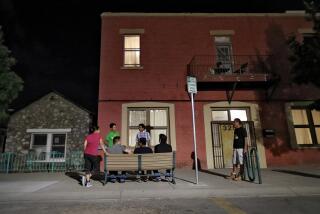Gays Can Be Denied Big Brothers Role, Judge Rules
- Share via
A Superior Court judge has ruled that Big Brothers of Greater Los Angeles is comparable to a religious organization and therefore can exclude homosexuals from being Big Brothers.
Los Angeles Superior Court Judge John Zebrowski ruled that a Big Brothers’ policy barring homosexuals on grounds that they are inappropriate role models does not violate the state civil rights act.
Zebrowski said the Unruh Civil Rights Act was intended to reach discriminatory businesses, not organizations such as Big Brothers. He rejected arguments that the central issue in the case was society’s persecution of homosexuals.
“The unadorned issue presented in this case is this: Who is ultimately entitled to choose the criteria for selection of those adult male volunteers who will be accepted into the Big Brothers program for matching as counselors, role models and confidants with fatherless young boys, the Big Brothers organization or the government?” Zebrowski asked.
First Amendment Right
The judge concluded that Big Brothers, not unlike a religious organization, had a First Amendment right to determine its own values and guidelines from which to select and reject candidates.
“The government has no more legitimate interest in interfering with this secular effort at promotion of a selected value system than it does in interfering with an analogous religious effort to promote a religious value system,” he wrote in a seven-page ruling issued late Friday.
Big Brothers of Greater Los Angeles is part of a nationwide network headquartered in Philadelphia. The group helps boys from broken homes by matching them with adult male volunteers who serve as role models. The organization makes more than 60,000 matches each year.
The case grew out of a lawsuit brought by Richard Stanley, 38, of Los Angeles, who argued that in 1984 he was illegally barred from the program because of his bisexual orientation.
Richard Kline, an executive board member of Big Brothers of Greater Los Angeles and a past president, said the ruling was an endorsement of a careful screening process handled by staff social workers.
“We are very pleased,” he said. “A Big Brother is one of the most important and influential people in a young boy’s life. He is looked up to for answers to the most personal and intimate questions.”
Concern Over ‘Identity’
John Heilman, a volunteer attorney for the American Civil Liberties Union, which represented Stanley, said the selection process for a Big Brother should have been limited to his client’s standing in the community, not his sexual orientation.
“All you need to look at is the number of homosexual men who are successful in the community. . . . How can they say that all homosexuals are poor role models for children?”
In a September, 1984, interview with a Big Brother social worker, Stanley was asked about his sexual preferences.
“I didn’t go in proclaiming myself one way or the other,” Stanley said. “I answered their questions directly and honestly. I was rejected outright.”
Stanley said he thought that it was unfair that only his sexual orientation was considered.
“I have the background and maturity that a 6- to 12-year-old boy and his mother would admire,” he said.
Big Brothers of Greater Los Angeles does not deny that its policy is to automatically reject all candidates who are homosexual.
“Our view is that it’s not appropriate to match a homosexual man with a little brother,” Kline said. “We make no make no judgment or interpretation of individual life style. We are simply looking for the best possible role model for an impressionable young boy.”
To apply the Unruh Civil Right Act--which prohibits businesses from discriminating against homosexuals and other groups--Big Brothers would have to be considered a business.
ACLU attorneys argued that the organization operates as a business with a 50-member executive board and an annual budget of more than $700,000.
But Zebrowski rejected that argument.
“To term (Big Brothers) a ‘business establishment’ is not within the realm of reason,” he wrote. “Membership in the group is not open to the public generally, nor even to any substantial component of the public.”
ACLU attorneys have not decided if they will appeal the decision.
More to Read
Sign up for Essential California
The most important California stories and recommendations in your inbox every morning.
You may occasionally receive promotional content from the Los Angeles Times.













